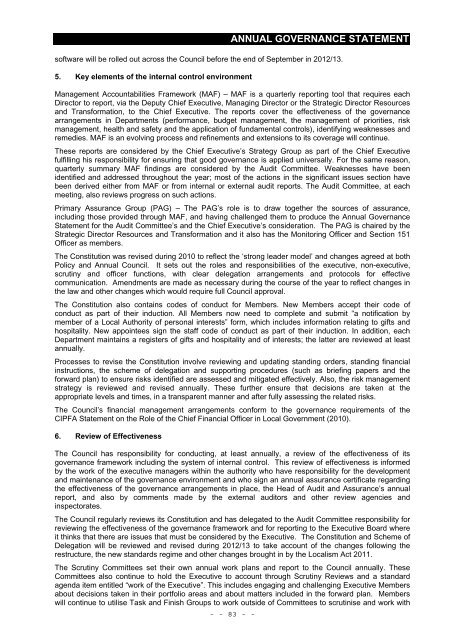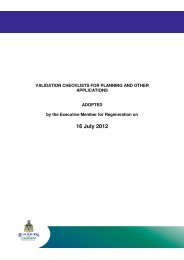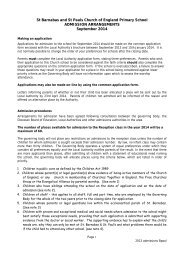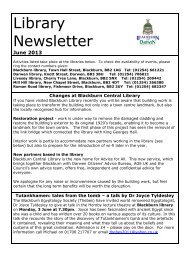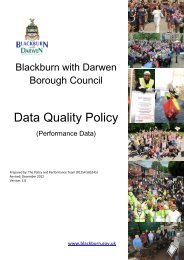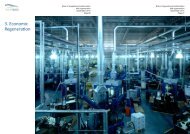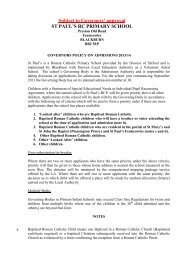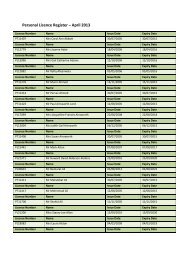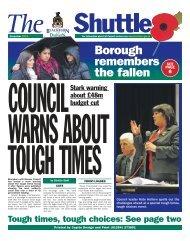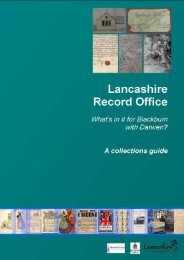Statement of Accounts 2011/2012 - Blackburn with Darwen Borough ...
Statement of Accounts 2011/2012 - Blackburn with Darwen Borough ...
Statement of Accounts 2011/2012 - Blackburn with Darwen Borough ...
Create successful ePaper yourself
Turn your PDF publications into a flip-book with our unique Google optimized e-Paper software.
ANNUAL GOVERNANCE STATEMENT<br />
s<strong>of</strong>tware will be rolled out across the Council before the end <strong>of</strong> September in <strong>2012</strong>/13.<br />
5. Key elements <strong>of</strong> the internal control environment<br />
Management Accountabilities Framework (MAF) – MAF is a quarterly reporting tool that requires each<br />
Director to report, via the Deputy Chief Executive, Managing Director or the Strategic Director Resources<br />
and Transformation, to the Chief Executive. The reports cover the effectiveness <strong>of</strong> the governance<br />
arrangements in Departments (performance, budget management, the management <strong>of</strong> priorities, risk<br />
management, health and safety and the application <strong>of</strong> fundamental controls), identifying weaknesses and<br />
remedies. MAF is an evolving process and refinements and extensions to its coverage will continue.<br />
These reports are considered by the Chief Executive’s Strategy Group as part <strong>of</strong> the Chief Executive<br />
fulfilling his responsibility for ensuring that good governance is applied universally. For the same reason,<br />
quarterly summary MAF findings are considered by the Audit Committee. Weaknesses have been<br />
identified and addressed throughout the year; most <strong>of</strong> the actions in the significant issues section have<br />
been derived either from MAF or from internal or external audit reports. The Audit Committee, at each<br />
meeting, also reviews progress on such actions.<br />
Primary Assurance Group (PAG) – The PAG’s role is to draw together the sources <strong>of</strong> assurance,<br />
including those provided through MAF, and having challenged them to produce the Annual Governance<br />
<strong>Statement</strong> for the Audit Committee’s and the Chief Executive’s consideration. The PAG is chaired by the<br />
Strategic Director Resources and Transformation and it also has the Monitoring Officer and Section 151<br />
Officer as members.<br />
The Constitution was revised during 2010 to reflect the ‘strong leader model’ and changes agreed at both<br />
Policy and Annual Council. It sets out the roles and responsibilities <strong>of</strong> the executive, non-executive,<br />
scrutiny and <strong>of</strong>ficer functions, <strong>with</strong> clear delegation arrangements and protocols for effective<br />
communication. Amendments are made as necessary during the course <strong>of</strong> the year to reflect changes in<br />
the law and other changes which would require full Council approval.<br />
The Constitution also contains codes <strong>of</strong> conduct for Members. New Members accept their code <strong>of</strong><br />
conduct as part <strong>of</strong> their induction. All Members now need to complete and submit “a notification by<br />
member <strong>of</strong> a Local Authority <strong>of</strong> personal interests” form, which includes information relating to gifts and<br />
hospitality. New appointees sign the staff code <strong>of</strong> conduct as part <strong>of</strong> their induction. In addition, each<br />
Department maintains a registers <strong>of</strong> gifts and hospitality and <strong>of</strong> interests; the latter are reviewed at least<br />
annually.<br />
Processes to revise the Constitution involve reviewing and updating standing orders, standing financial<br />
instructions, the scheme <strong>of</strong> delegation and supporting procedures (such as briefing papers and the<br />
forward plan) to ensure risks identified are assessed and mitigated effectively. Also, the risk management<br />
strategy is reviewed and revised annually. These further ensure that decisions are taken at the<br />
appropriate levels and times, in a transparent manner and after fully assessing the related risks.<br />
The Council’s financial management arrangements conform to the governance requirements <strong>of</strong> the<br />
CIPFA <strong>Statement</strong> on the Role <strong>of</strong> the Chief Financial Officer in Local Government (2010).<br />
6. Review <strong>of</strong> Effectiveness<br />
The Council has responsibility for conducting, at least annually, a review <strong>of</strong> the effectiveness <strong>of</strong> its<br />
governance framework including the system <strong>of</strong> internal control. This review <strong>of</strong> effectiveness is informed<br />
by the work <strong>of</strong> the executive managers <strong>with</strong>in the authority who have responsibility for the development<br />
and maintenance <strong>of</strong> the governance environment and who sign an annual assurance certificate regarding<br />
the effectiveness <strong>of</strong> the governance arrangements in place, the Head <strong>of</strong> Audit and Assurance’s annual<br />
report, and also by comments made by the external auditors and other review agencies and<br />
inspectorates.<br />
The Council regularly reviews its Constitution and has delegated to the Audit Committee responsibility for<br />
reviewing the effectiveness <strong>of</strong> the governance framework and for reporting to the Executive Board where<br />
it thinks that there are issues that must be considered by the Executive. The Constitution and Scheme <strong>of</strong><br />
Delegation will be reviewed and revised during <strong>2012</strong>/13 to take account <strong>of</strong> the changes following the<br />
restructure, the new standards regime and other changes brought in by the Localism Act <strong>2011</strong>.<br />
The Scrutiny Committees set their own annual work plans and report to the Council annually. These<br />
Committees also continue to hold the Executive to account through Scrutiny Reviews and a standard<br />
agenda item entitled “work <strong>of</strong> the Executive”. This includes engaging and challenging Executive Members<br />
about decisions taken in their portfolio areas and about matters included in the forward plan. Members<br />
will continue to utilise Task and Finish Groups to work outside <strong>of</strong> Committees to scrutinise and work <strong>with</strong><br />
- - 83 - -


